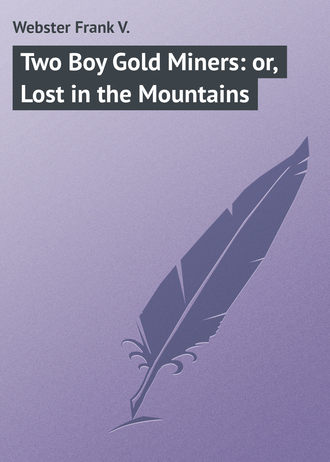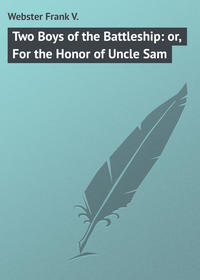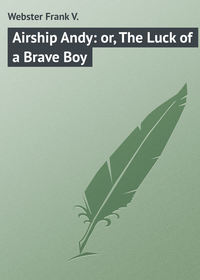 полная версия
полная версияTwo Boy Gold Miners: or, Lost in the Mountains
But when, a day or so later, the dead cow was sold for the hide, only a small sum was realized. As Mr. Crosby could not afford money for another animal, the family had to buy milk and butter of a neighbor.
Gabe Harrison remained at the farm, for there was plenty of work to do, as, following the rain, a big crop of weeds sprang up, and had to be hoed down. This labor the old miner could do very well, and for a week Mr. Crosby, his two sons, and Mr. Harrison were kept very busy.
But even the rain could not make up for the long dry spell, and it did not need a very expert farmer to see that only about three-quarters of the usual crop could be harvested from the Crosby place.
"I'm afraid we're going to have a hard time this winter," remarked the farmer to his wife one night, after the others had gone to bed. "Pork is going to be high, and so is feed, as there was a short crop of hay, and the horses eat an awful lot."
"It's too bad. What can we do?"
"I don't know, Debby. Sometimes I'm tempted to sell out and go to some other place."
"Where do you mean?"
"Well, down South or farther West. I've been struggling along for several years now, working hard, and barely making a living. I can't get a dollar ahead, try with all my might."
"Yes, you do work terribly hard, Enos. I wish you didn't have to."
"Oh, I don't mind the work. It's the lack of returns that I'm dissatisfied with. You work hard for that matter, and so do the boys."
"And Nettie does her share. Poor girl, she wants a new dress very much to wear to the Sunday-school picnic next week."
"I wish I could get it for her, but I don't see how I can. Money is dreadfully scarce, and I can't borrow any more. I suppose I could sell one of the pigs – "
"No, I wouldn't think of that," objected his wife. "We'll need them for pork this winter. Nothing like pork to see you through a hard winter. Nettie will have to wear the old dress. Maybe I can turn it again, though the land knows I've done that twice already. But she'll not complain."
"No, she's a good girl, and my boys are good boys. If they don't have all that lads of their age should, they don't make long faces over it. Maybe times will be better soon."
"Are you going to keep Mr. Harrison much longer?"
"No. I think I'll have to let him go next week. I need his help, but I can't afford to pay him. He works for less than a younger man would, and he does almost as much. But the boys and I will have to get along as best we can."
Though the dry spell was broken there came other troubles for Mr. Crosby. Some of the corn became affected with a fungous disease called "smut," and part of that crop was worthless. The potatoes too began to rot in the ground, and things looked very gloomy indeed. Mr. Harrison took his dismissal good-naturedly. He said he expected to travel on, anyhow, and he was not particular where he stayed.
The week he was to leave, things were rather dull on the farm. All the work it was possible to do had been attended to, and it was only necessary to wait for the maturing of the various crops before harvesting them.
There was one spot of brightness in all this gloom. A big field of barley, which Mr. Crosby had not thought would amount to much, turned out a much larger crop than he expected. Then there happened to be a short supply of that particular grain in that section of the country, and the price went up, unexpectedly.
"Maybe things won't be so bad, after all," said the farmer, on hearing this news. "I was to the city to-day, and I had an offer from a big dealer for my barley. I was about to take it when another man offered me much more. This shows there is going to be a big demand for it, and I'm going to hold on to mine. If I can get a little more per bushel than the last offer, it will see me through the winter nicely, and leave a bit over."
"Well, that certainly is good news," said Mr. Harrison. "I'm glad I heard it before I left, for I'll be thinking of you people often this winter."
"Oh, I almost forgot about it," spoke Mr. Crosby. "I stopped at the post-office on my way home, and here's a letter for you."
"For me?" inquired the old miner in some surprise. "I wonder who can be writing to me?"
"The best way is to open it and then you can tell," said Jed, with a smile.
"Oh, I know now. It's from Ted Jordan. I know his writing. It's like a hen that stepped in an ink bottle and then tried to do a dance. Wonder what he's writing to me for from away out in Montana?"
He tore open the envelope.
"How did he know your address?" asked Will.
"Oh, I sent him one of them souvenir postcards as soon as I got here. I done it more for a joke. Sent him one with a picture of a farmer on it, and told him I'd gone to tilling land for a living. But let's see what he says I'll read you the letter. Guess there's nothing very private in it, and Ted is a jolly chap.
"'Dear Gabe,'" read the old miner. "'Sorry to hear you got so down on your luck you had to turn farmer. Your picture don't look a bit like you, but I suppose the crows have been picking at you. Say, I have great news for you. Old Sim Butterfield, the fellow that had one ear bit off in a fight, got into trouble with a gambler out here the other day, and now the other ear is gone.'"
"How terrible!" exclaimed Mrs. Crosby.
"Oh, jest as like as not 'tain't true, ma'am. Ted is a terrible joker. But what's this?"
Mr. Harrison had turned to the last page of the letter and was earnestly reading it.
"Listen to this!" he exclaimed. "'There has been a big strike made near Dizzy Gulch. I'm going there, and so are a lot of the boys. Better chuck up your farming and join us. The new diggings are as rich as butter. Shall I stake out a claim for you?'"
No one said anything for a few seconds. This unexpected news from the West, coming into that quiet farmhouse, was like a glimpse into another world. Jed was staring curiously at Gabe. Will's eyes were big with wonder at hearing of men who were about to set off in a quest for gold.
"Do you suppose that's a joke?" asked Mr. Crosby.
"No, sir!" exclaimed Gabe, firmly. "Ted Jordan don't joke about such a serious subject as prospecting for gold. This settles it. I'm going out there as fast as I can make tracks for the West. I'm glad I saved my old pick now. It'll come in handy. Yes, sir, I'm off for Dizzy Gulch!"
Jed had risen to his feet. He was strangely excited.
"Do you suppose there'd be gold enough out there for any other persons, Mr. Harrison?" he asked.
"Enough? Of course there'll be! If it's any kind of a strike at all, it's a good one, or Ted Jordan wouldn't be going. But why do you ask?"
"Because I want to go!" exclaimed the lad quickly. "I've been thinking of it. Times are dull on the farm, and now that fall is coming on, there won't be work enough for us boys. Dad, can't Will and I go gold mining?"
"Gold mining?"
"Yes. With Mr. Harrison. Will you take us?" and the youth turned to Gabe.
"Take you? Why, of course I will, and welcome. That's a fine idea, Mr. Crosby. The two boys and I will go prospecting for gold, and when we find a good claim we'll send for you. Let 'em go. It'll pay better than farming, take my word for it. We can start in a couple of days."
"Hurrah for the gold mines of Dizzy Gulch!" exclaimed Jed, grabbing Will by the hand, and jumping around the room. "That's the stuff! Let the crops fail, we'll dig a new one – a yellow one of gold nuggets!"
CHAPTER VII
OFF FOR THE WEST
Never before, save, perhaps, when the lightning struck, had there been such excitement in the Crosby home. The farmer and his wife stared in amazement at the sight of their two sons doing a good imitation of a Highland fling, for Will had caught Jed's enthusiasm, and the two boys were singing and leaping about, "as if they were circus performers," as their mother said afterward.
"Come on, Nettie, have a waltz!" exclaimed Jed. "We'll send you back enough gold for a pair of earrings and a bracelet!"
"Jed! Jed!" exclaimed his mother. "Do behave yourself. You're not going to let them undertake that crazy plan, are you?" she asked of her husband.
Mr. Crosby did not answer. He, too, was thinking of the golden West, and his poor farm that hardly supported him.
"Of course we can go. Can't we, dad?" asked Jed. "Why, it will be the best thing that ever happened!"
"It will – if we get the gold," added his brother, more soberly, for his first enthusiasm had begun to cool.
"Find the gold? Of course we'll find the gold. Won't we, Mr. Harrison?"
"Well, I always have been pretty lucky," replied the miner. "I always got gold when I went after it, but I didn't always keep it. If I had the money the gambler swindled me out of I'd be in good shape now."
"Maybe that gambler your friend wrote about is the same one who swindled you," suggested Jed.
"No. I guess Con Morton knows enough to keep away from Ted Jordan. He's looking for him, too. But I'll come across Con some day, and then I'll wager I'll make him shell out what he stole from me. But, Mr. Crosby, seriously speaking, why can't these two boys go with me? It will do them good. As Jed says, you won't need them on the farm now, and they may strike it rich. Stranger things have happened."
"I don't know that I would object to having them go, in your company," said the farmer, "for I know they are good boys, and can take care of themselves. But I'm afraid I couldn't spare the money for railroad fares, and for the outfits."
"Don't let that worry you," advised Gabe.
"But it does worry me. You can't do anything in this world without money."
"It doesn't take much to get an outfit for a gold prospector," replied the miner. "For that matter I'll undertake to see that they get what they need. I have friends enough out there to make that part easy."
"But the railroad fares?"
"We won't need any railroad fares."
"How are you going to get out to that place with the queer name, then?" asked Mrs. Crosby.
"Dizzy Gulch, you mean? That is a queer name, but it's a good one. It makes you dizzy when you stand on the edge and look down. But we'll get there all right. It's not more than eight hundred miles from here."
"You can't walk that far," objected Nettie.
"I know that," replied the miner. "We could, but we don't want to. We'll go on horseback."
"Horseback?" repeated Jed.
"Yes. I've got money enough to purchase a good nag, and I guess your father would be willing for you boys to take the animals here. He'll not need them much longer. How about it, Mr. Crosby?"
The farmer looked thoughtful.
"You seem to get over most of the difficulties," he remarked.
"Then we can go, can't we, dad?" exclaimed Jed.
"I don't know. I must consider it further. I suppose you could take the horses. They'll only be eating their heads off in the barn, after the crops are in."
"That's the way I figured it," resumed Gabe. "Now I'll tell you what I'll do. I'll write to Ted and ask him to send me word where is the best place to strike for. Then I'll get my outfit together, such as there's left of it, look around for a horse that can travel a long distance, and we'll set out for the gold regions."
"That's the way to talk!" cried Jed. "We'll all be millionaires soon!"
"Now hold on!" remonstrated Gabe. "Don't get the idea that you can go out there and pick up gold off the ground. There are some places, I admit, where the nuggets are close to the surface, but they're few and far between. If we get any gold we'll probably have to dig for it, and digging for the yellow boys is as hard as cultivating corn or hoeing potatoes. I know, for I've tried both. But, at the same time, I don't see why we haven't as good a chance as lots of others. We'll try, anyhow – that is, if your father gives his consent."
"I suppose I might as well," said Mr. Crosby slowly. "You three seem to have it all planned out, anyhow. But I can't spare the horses for a week or two."
"That will be time enough," replied the miner. "I want to hear from Ted again." And there the conversation, for the time being, came to an end.
"It hardly seems possible; does it, Will?" asked Jed, when they were going to bed that night. "To think that we're going to become real gold miners!"
"Maybe we won't get any gold after all our trouble," suggested his less hopeful brother.
"Oh, cheer up!" advised Jed. "Wait until Gabe gets to grubbing around with that lucky pick of his, and the nuggets will just roll out, they'll be so glad we've come."
Will laughed. There was no withstanding the jolly good nature of his elder brother.
Enthusiasm for the proposed gold hunt had not waned the next day. Mr. Crosby had talked the matter over with his wife and, though she was naturally timid and nervous, she made no objections to letting the boys go. Mr. Harrison seemed quite confident that in the new diggings there was a good chance of making a moderate fortune.
"Then you can pay off the mortgage on the farm," said Mrs. Crosby to her husband.
"If the boys get money enough for that out of their gold mining, I think I'll give up farming, and become a prospector myself," said Mr. Crosby, with a smile.
Fortunately for the plan, the barley crop turned out better than any one expected, and the price was very high. Mr. Crosby received enough money to insure them against hardships that winter, and even enough to buy another horse, as he might need one if the boys took the two. He secured an animal at a low price. It was not as good as the two he had, but Jed and Will would have to have steeds that could stand a certain amount of hard life, if they were to go to the gold regions.
In the meanwhile Mr. Harrison had another letter from Ted Jordan, and this confirmed the first rumors of rich strikes. There was quite a rush of miners and others to the new fields, Jordan wrote, and he advised Gabe and the boys to hurry.
So, one morning, with their simple outfits on the saddles back of them, the boys and Gabe Harrison mounted their horses, and started off for the golden West.
"Don't you boys go to gambling," cautioned Mrs. Crosby, as she waved a farewell to her sons.
"Now, mother, you know they won't do that," said Nettie.
"I know it – but – but I – I just had to say something," replied her mother, as she tried to hide the tears that would persist in coming into her eyes.
"Look out for a bagful of gold nuggets!" called back Jed. "I'll send them by the first mail."
"All right," answered his father with a laugh. "Good luck, boys, and write when you get a chance."
"Good-by!" they chorused, and Gabe Harrison waved his broad-brimmed hat at the little group standing in front of the farmhouse. Soon they were out of sight down the road.
"It's – it's lonesome – without the boys," said Mrs. Crosby softly, as she went in the house and closed the door.
CHAPTER VIII
THE BUCKING BRONCO
"How long do you think it will take us to get to the gold fields?" asked Jed, of the old miner, as they jogged forward.
"It's hard to say," was the answer. "You mustn't be in too much of a hurry. It's a good rule, in this business, to make haste slowly. You can't make a fortune gold-hunting in one day, and you've got to save your own strength, and that of your horse. A horse is a man's best friend in this country."
The route to the West had been carefully laid out by Mr. Harrison, who knew the land well. He had selected a line of march that, while it was not the shortest, would bring them to the Montana gold fields in good shape to start in at once with their prospecting.
For a week the travelers made fair time, stopping at night in various small towns, where living would be cheaper than in large cities, for their capital was limited. Nothing of note occurred, the weather was good, and Jed and Will began to think that gold hunting, or at least the preliminary part of it, was very much easier than farming.
"Say, I'd hate to go back now, cultivating corn in that hot field, wouldn't you?" Jed asked his brother one afternoon, as they were jogging slowly along.
"I certainly would, but I wouldn't mind now, if I had a drink of nice, cold switchel."
"Me either. You don't see any signs of a spring along the road anywhere, do you, Mr. Harrison?"
"No, and I wish I did, for the horses are pretty thirsty. But we ought to strike one soon."
"With all that, this is easier than farming," went on Jed.
"Don't be too sure of that," cautioned the old miner. "You haven't half begun yet."
And it was not long after this that Jed changed his mind about thinking it was easy to hunt for gold.
"That looks like a place where there was a spring," said Will, a little later, as they advanced around a turn in the road, and saw several horses, with men standing beside them, halted in the shade of a big tree.
"Guess you're right," admitted Gabe, "We're in luck."
It was a wayside spring, and the thirsty horses, scenting the water, hastened their pace. The gold-seekers found five men gathered around the drinking trough, into which the spring emptied through a wooden pipe. Four of the men were middle-aged, and one was quite young. They were all smoking, the older men using pipes, while the younger was rolling a cigarette with one hand, an operation at which he seemed quite adept.
"Howdy, strangers," greeted Mr. Harrison genially, as he alighted from his horse. "How's the water?"
"Nice and sweet," replied one of the men. "Come far?"
"We've done forty miles to-day."
"That's pretty good. Going far?"
"Montana."
"Montana?" exclaimed another man. "Why, that's where me and my pardner are bound. Going to the new fields?"
Mr. Harrison nodded. There was no object in concealing their destination, for they would soon be in the midst of the rush that always takes place when new gold fields are discovered.
"My name's Fred Hurd," went on the man who had last spoken. "This is my partner, John Curtin. We were in Nevada, but we went East to spend some of our money, and managed to get rid of most of it. Now we're going to new fields."
"My name's Gabe Harrison," said the old miner, and he introduced the two boys, in the hearty and easy fashion that prevails in the West. The other three men also told their names. They were Ade Bryant, the young man who smoked cigarettes, and Tim Walsh and Bill Case.
"Are you miners, too?" asked Jed, of the latter three.
"Nope," replied Ade Bryant, with a pleasant smile. "We just got rid of a bunch of steers, and we're going back to our ranch in Montana. My father owns it. It's the Diamond T Ranch," he went on, giving the name of the brand marked on all the cattle from that ranch. "Probably you've heard of it?"
The boys shook their heads. They had not heard much of outside matters in the quiet country village where they had lived nearly all their lives.
"Is your father Colonel Jack Bryant?" asked Gabe suddenly.
"That's him," replied the young man eagerly. "Do you know him?"
"No, but I've heard lots about him. There ain't a finer cattleman in these parts than Colonel Jack Bryant, and I'm glad to meet his son. Put her there, my boy!" and the old miner extended his hand to greet the young man.
When the horses had been watered and rested, the five men found that they were traveling in the same direction as was Gabe and the boys.
"Well, we'll keep company, if it's agreeable to you," proposed Mr. Hurd. "We've got plenty of grub, and we can camp together to-night."
"That suits me right down to the ground," replied Harrison, and the boys were also pleased to have company.
As the five men remounted, to continue their journey, Will noticed that Bill Case, the oldest of the cattlemen, was leading a small horse, tied by a long rope to the saddle horn of his own pony.
"Do you take turns riding those horses?" asked Will, for he was fond of animals, and a very good rider.
"No," replied Mr. Case, with a wink at his companions, which Will did not see, "that horse is a new one I bought. He's one of the fastest in this section, but the trouble is no one can ride him."
"Why not?" asked Will.
"Because he's got such a temper. Not exactly bad, you understand, but as soon as any one gets on his back, he doesn't do as a decent horse should, and carry his rider along the right way."
"I believe I could ride him," went on Will, who liked the looks of the steed.
"Are you much of a rider?" asked the man, and again he winked at his companions.
"Pretty fair," replied Will, who did not like to boast. The truth was, he was the best rider around Lockport, but he did not know what was in store for him from the innocent-looking animal that trailed along so meekly at the saddle horn of Bill Case.
"You can try this one, if you like," went on the cattleman. "I've no objection. In fact I'd like to see some one ride him. Maybe he'd be more valuable then. He needs training, but I can't seem to do anything with him."
The truth of the matter was that the horse was one of the very worst types of "bucking broncos." That is, whenever a person got on his back he would jump up into the air, and come down on four feet stiffly, almost jarring the rider out of the saddle. In fact he usually did jar him off, or, if he could not get rid of the man on his back in that way, he had other tricks as bad as bucking.
Bill Case had bought the horse at the town where he had been with his employer's cattle, and he was taking the animal back to the ranch, mainly to use in cowboy sports, for a bucking bronco is not much use as a riding steed. Bill had tried, unsuccessfully, to ride the steed, that was all right, and gentle, as long as no one tried to get on its back.
By this time Mr. Harrison and Jed were some distance ahead. They were interested in talking about gold strikes to the two miners, and had, with Hurd and Curtin, unconsciously drawn away from Will, and the three cattlemen.
"Will you let me try him?" asked the boy, as he looked at the horse. He knew nothing of bucking broncos, though he had read about them. Still, there was no way of telling one by merely looking at it.
"Sure thing," replied Mr. Case. "Here's a nice level stretch. You can try him here," and he stopped, and unfastened the long rope. At the same time he whispered to his companions: "Watch the fun now."
Will, all unaware of what was in store for him, dismounted from his own patient, plodding horse, and approached the bronco.
"Jump right on his back," advised Bill Case. "You don't need a saddle."
He knew that the moment a saddle touched the animal's back it would begin to buck, and that would give the "joke" away.
Will took hold of the animal's bridle, and patted the horse on the muzzle. Then, with a quick motion, he leaped on the bronco's back.
So suddenly was it done that the animal hardly knew what to make of it. On other occasions there had been a great fight to get a saddle on him, and this prepared him for what was to follow. But this was a new one on him. Still, he made up his mind, did that bronco, that he was not going to submit to the indignity of having a person on his back. He stood still a moment.
"Well done!" cried Bill. Then he added, in a lower tone: "Watch the fun now, boys!"
"Get up!" exclaimed Will, striking the bronco lightly on the flank.
Instantly something happened. Gathering himself together, as if he had wire springs in his legs, the bronco shot up into the air. Will was taken completely by surprise, but he managed to stay on. Then the horse came down stiffly, jarring the boy so that he thought he would shake to pieces.
But he did not fall off. Instinctively, he gripped his legs around the horse, and drew the reins tighter. The bronco was surprised. Usually one "buck" was enough to unseat any rider. He would try a new plan.
Suddenly he started off at a fast gallop. By this time Will knew he was in for it, but he was not going to give up. Gathering headway for another leap into the air, the animal rushed on toward where Mr. Harrison, Jed and the two miners were. Then, coming to a sudden stop, the animal launched himself upward. This time, when he came down stiffly, with his head between his fore legs, Will lost his grip. He was jarred off, and fell to the ground, his head striking heavily, and rendering him unconscious.






